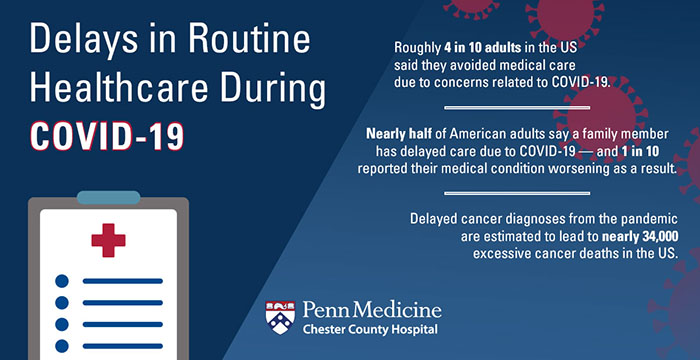Brushing your teeth twice a day, enjoying your morning cup of coffee while reading the newspaper, chatting with a loved one on Sundays — there are plenty of routines that you might adhere to. Fortunately, some of them were probably not disrupted by the COVID-19 pandemic.
However, other routines were completely upended, like work schedules, exercise classes, family get-togethers, and for some people, routine health exams.
Routine healthcare is one of the most effective ways to keep an eye on your health and prevent problems down the road. But due to COVID-19, many people delayed routine care. Delayed medical care has been the most common among people with disabilities and underlying health conditions, Black and Hispanic adults, young adults, and unpaid caregivers for adults.

While quarantines have been common this past year to prevent the spread of the virus, it’s important not to quarantine your routine check-ups. Here’s why resuming routine medical care is critical for your well-being — and how to make the most out of these appointments.
What Happens During Routine Health Exams?
Your body is one of the most well-oiled machines out there, but it needs some TLC from time to time. Just like you take your car in for oil changes or your bicycle in for a tune-up, you need to take yourself in for check-ups, too.
Even if you feel completely fine, routine check-ups help identify problems early on or before they even start. For instance, high blood pressure usually comes with no symptoms whatsoever. Routine health exams help to identify this condition early in order to prevent serious health problems, like chronic kidney disease, heart attack, and stroke.
Or, if you do have a known medical condition, monitoring is critical. If you have diabetes, for example, you should see your healthcare provider at least twice a year to prevent further complications, like nerve damage, kidney disease, or cardiovascular disease.
During a routine check-up, your healthcare provider will:
- Perform a physical examination, including height, weight, and body mass index (BMI)
- Screen for medical issues, such as high blood pressure or high cholesterol
- Evaluate your risk for medical problems in the future
- Discuss the importance of a healthy lifestyle
- Ensure you’re up-to-date on vaccinations
What’s more, these routine exams help maintain a strong and trusting relationship with your healthcare provider.
Depending on factors like your age, health, family history, and lifestyle choices (such as level of activity and smoking), you may also need routine screenings, such as those for diabetes, cardiovascular health, stroke, and certain cancers.
Early detection of these conditions often means more treatment options and better chances of cure.
Why COVID-19 Shouldn’t Keep You From Routine Healthcare
The COVID-19 pandemic has kept people at home as much as possible — and for good reason. Unfortunately, it has also led some to forego important medical appointments, putting their health on the line.
While the light at the end of this difficult tunnel is near, it’s normal if you still feel hesitant to venture out into the world. However, healthcare facilities are doing everything they can to keep you safe as you receive care.
At Chester County Hospital, we’ve brought together skilled healthcare professionals from all areas within the organization to ensure patients can get the care they need, when they need it — both during and after the pandemic.
Just some of the COVID-19 safety measures we are continuing to take include:
- Visitor restrictions
- COVID-19 screening
- Face mask requirements
- Reorganized waiting areas
- Enhanced cleaning
- Telemedicine appointments (schedule via MyChart by myPennMedicine)
Keep in mind — you might not even need to leave the comfort of your own home to meet with your healthcare provider. Instead, you may be eligible for a telemedicine visit.
How to Make the Most Out of Your Next Medical Appointment
Keeping up with routine care is an excellent first step. However, it’s also important to make the most of these appointments with a little preparation.
Make a list of each of the following that applies, and bring it with you to your appointment:
- Medicines, vitamins, or herbs you take
- Medical concerns, including what symptoms you’re experiencing, when they started, and what makes them better or worse
- Questions you have
During your visit, if you don’t understand something your provider says, ask questions until you do. If you prefer, ask your provider for written instructions. It can also be helpful to take your own notes during your appointment to review later.
From childhood through adulthood, routine healthcare is a critical way to stay healthy. By taking the time to stay on top of these appointments — both during the pandemic and after — you can ensure your body is well taken care of now and for years to come.
Do You Have Questions about Routine Healthcare During and After the COVID-19 pandemic?
Call 610-738-2300 or view our Physician Directory to make an appointment with a Chester County Hospital Primary Care Provider.
Related Information from Chester County Hospital: